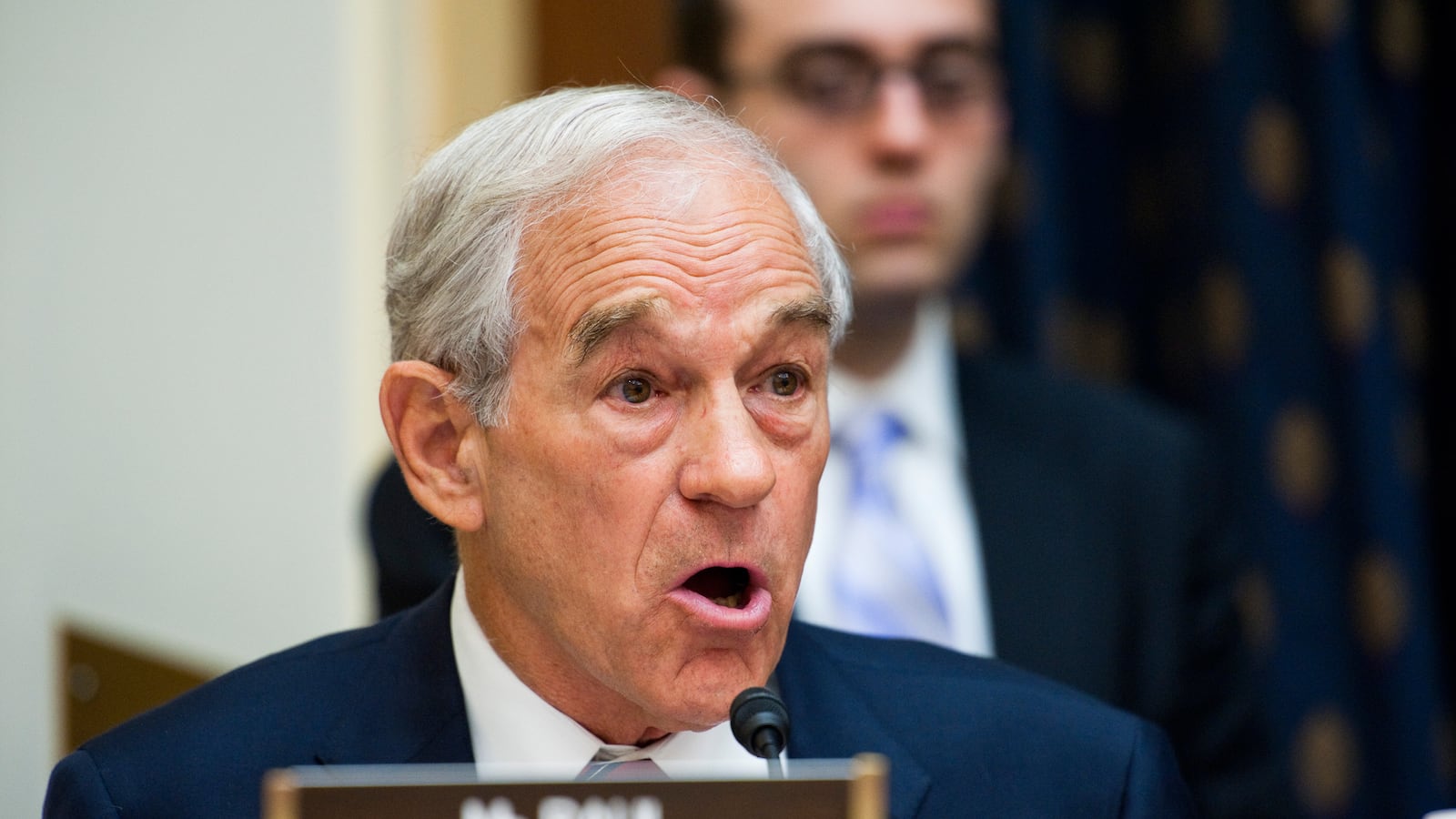Rand Paul is struggling to demonstrate that a presidential candidate can be skeptical of military adventures while still being tough on foreign enemies when necessary. And so far, all he is getting for his trouble is charges of flip-flopping.
Is there any recent precedent for a reluctant but strong warrior in Republican politics? Paul has been citing Ronald Reagan, but there is another, and perhaps more surprising, model: Ron Paul, the Kentucky senator’s own father.
This may seem counterintuitive. While the elder Paul’s two Republican presidential campaigns put noninterventionism back on the political map, his rhetoric is often a textbook example of how not to sell such foreign-policy ideas to the wider GOP base.
Ron Paul’s first stints as a Republican congressman from Texas were during the 1970s and ‘80s, however. As a libertarian-leaning lawmaker, he frequently disagreed with his GOP colleagues on foreign policy back then too. But, unlike some more militant libertarian thinkers, Ron Paul never dismissed the threat of communism during the Cold War.
In 1976, Paul marked the death of Mao Tse-tung by taking to the House floor to denounce the “virtual censorship in America about the true facts regarding oppression in Communist China.” Those facts, Paul said, indicated that Chairman Mao was a tyrannical monster whose people lived “in abject slavery.”
Paul said it was “foolish to believe that the Chinese people do not have the same yearning for freedom that we have,” adding that the “untold thousands who have risked their lives to escape for the liberty of Hong Kong” prove otherwise. And when it came to Communists, Ron Paul didn’t have time for détente.
“We are asked to be ‘realists’ and overlook such unpleasantries because we need the support of Communist China as a balance to the growing military power of the Soviet Union,” Paul said in the same 1976 remarks. He then praised the United States for rejecting such thinking in the past and “establishing a foreign policy that not only upholds American interests, but is moral as well.”
“This is a tradition that is as old as the country itself and which survives today, in spite of Henry Kissinger’s efforts to destroy it,” Paul thundered.
Ron Paul, sounding like a neocon? The Weekly Standard and Washington Free Beacon didn’t exist in 1976, but maybe the great libertarian hope had been reading too much Commentary.
Except right after the Kissinger-bashing comes this. “It is unfortunate that our foreign policy has been so mismanaged that the American people seem to equate a moral foreign policy with an interventionist foreign policy,” he said. “The two are not at all synonymous.”
Later in his book Foreign Policy of Freedom, Ron Paul acknowledged this “may be more hawkish than I would be today, but we certainly have moral authority to state our position without violating the independence of others.”
Ron Paul opposed the weapons-limiting SALT II treaty with the Soviets, arguing in a 1979 issue of his “Freedom Report” newsletter, “this would probably lead to permanent US weakness and the make the Soviet Union the undisputed military superpower in the world.” He added, “It would be profoundly destabilizing; and far from promoting peace, it would endanger it.” Paul complained that for more than a decade prior to the treaty “the Soviet Union has outspent us on military offense and defense by 35% to 40%.” This is at least as hawkish as anything Rand Paul has ever said about Vladimir Putin’s Russia.
When Ronald Reagan invaded Grenada in 1983, Ron Paul sounded much like his son on Iraq and ISIS: skeptical both of intervention, especially if not done with congressional approval in accordance with the Constitution, and those who denied the U.S. had any national interest in Grenada.
“It now appears that there were troops and advisers in Grenada from Libya, Cuba, Bulgaria, the Soviet Union, East Germany and North Korea,” Paul said on the House floor in 1983. “If that is the case, I fail to see how anyone can believe that Grenada posed no threat to our well-being.” He also acknowledged that “we have a legitimate national interest” in Grenada.
Ron Paul supported Reagan on the Strategic Defense Initiative or “Star Wars.” In December 1983, he chastised those who said Reagan would be “militarizing” space. “Despite the barrage of propaganda from the Kremlin—propaganda that has been scandalously effective at influencing public opinion in the West—space has already been ‘militarized,’” he argued. “And it is the Soviets that have been the ‘militarizers.’”
Paul continued to support missile defense as a Libertarian Party presidential candidate in 1988. “I think that it’s worth doing research on SDI, but I would take the money out of the money we spend overseas,” he said in an interview. “Seventy percent of our military money is spent overseas subsidizing rich allies that should be spent on the defense of this country, such as SDI.” Years later, Rand Paul has emphasized missile defense to protect both U.S. and Israeli national security.
Unlike John Kerry, Ron Paul opposed the nuclear freeze movement, a popular liberal demand to stop producing and deploying American strategic nuclear forces. He voted against a nuclear freeze resolution that passed the Democratic-controlled House in 1983.
“My primary objection to a nuclear freeze treaty with the Soviet Union is that I am unwilling to trust the freedom and independence of the United States to the promises of the Soviet ruling elite,” he explained. “The Soviets have broken almost every treaty they have ever signed, once it was no longer to their advantage to abide by its terms.”
Rand Paul has frequently proposed cutting off foreign aid to hostile countries as a way to advance noninterventionism among more hawkish conservatives. His father did the same, condemning aid to the Soviet Union.
“The Soviets get the goods,” Ron Paul complained in 1980. “The big banks and companies get the profits. And the taxpayer gets the bill.”
This Cold War Ron Paul hasn’t shown up as much during the war on terror, though there have been occasional sightings. Paul voted for the resolution that authorized the invasion of Afghanistan. He justified his vote against the Iraq war by saying he didn’t see an imminent terrorist threat from Baghdad.
“If I were convinced of such a threat I would support going to war, as I did when I supported President Bush by voting to give him both the authority and the necessary funding to fight the war on terror,” Paul explained.
Very little of this history has been preserved, because it doesn’t fit comfortably in either libertarian or neoconservative narratives. An exception is The New American, a magazine published by the John Birch Society, which (whatever else might be said about it) was simultaneously noninterventionist and anti-Communist.
Ron Paul was more dovish than most Republicans and more hawkish than some libertarians, but mostly preferred foreign aid cuts and missile defense to direct military interventions in foreign countries.
Sound familiar?
W. James Antle III is editor of the Daily Caller News Foundation and author of Devouring Freedom: Can Big Government Ever Be Stopped?






